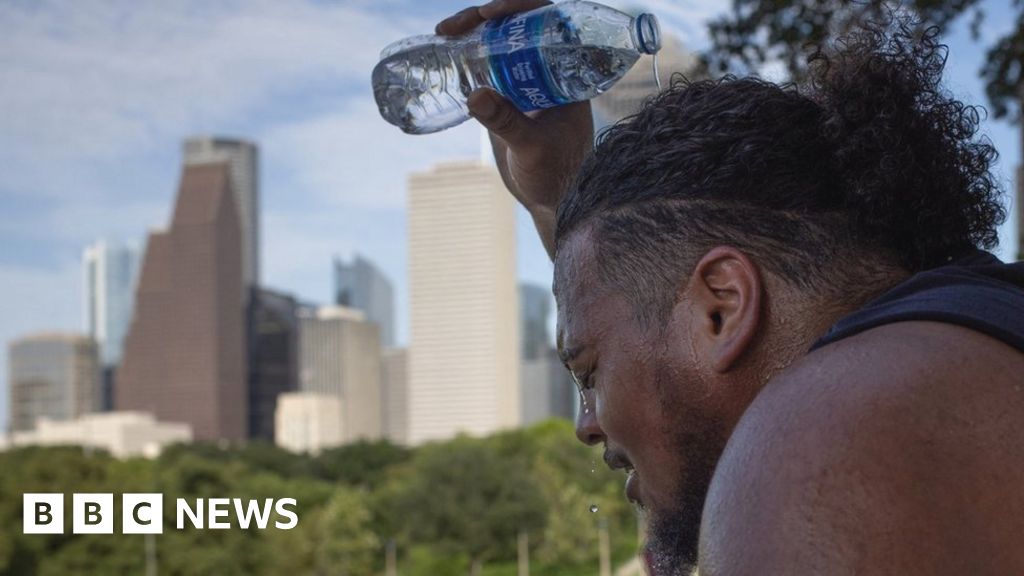- By Nadine Yousif & Christy Cooney
- BBC News, Toronto & London
Energy consumption in Texas has broken records as many in the state struggle to stay cool.
Parts of the US are expected to see record temperatures on Sunday, with “dangerous” heat conditions being warned across the Southwest next week.
Nearly a third of Americans — about 113 million people — are currently under heat advisories from Florida to California and Washington state.
The country’s National Weather Service (NWS) has urged people not to underestimate the risk to life.
On Saturday, a record high of 118F (48C) was recorded in Phoenix, Arizona.
That means 16 days of running temperatures have reached 110F (43C), which is almost a record.
Mobile clinics there have reported treating homeless people with third-degree burns.
Meanwhile, Death Valley in California – one of the hottest places in the world – is predicted to reach 129F (54C), approaching the hottest temperature ever reliably recorded on Earth.
Local records could be set in the San Joaquin Valley, Mojave Desert and Great Basin on Sunday, the NWS said.
Its Saturday-evening update said the temperature “poses a health risk and is dangerous for anyone without effective cooling and/or adequate hydration”.
According to the Centers for Disease Control and Prevention (CDC), an estimated 700 people die each year from heat-related causes in the United States.
In neighboring Canada, wildfires fueled by above-average temperatures – which have smoldered parts of the United States – have now burned nearly 10 million hectares (25 million acres), officials say.
Temperatures in the American Southwest are the result of an upper level of high pressure that usually brings warmer temperatures, the NWS said earlier, adding that the heat wave was one of the “strongest” systems. region.
Las Vegas, Nevada, could match its all-time high of 117F (47C) in the next few days.
Weather officials there warned locals they thought they could handle the temperatures, “not your typical desert heat.”
“‘It’s the desert, sure it’s hot’—a dangerous mindset!”, tweeted the NWS in Las Vegas.
“This heat wave is not a typical desert heat wave because of its long duration, extreme daytime temperatures and warm nights. Everyone, including desert dwellers, should take this heat seriously.”
A woman suffering from heat exhaustion was taken to a medical center in Texas
The NWS also warned that “severe thunderstorms, heavy rain and flooding are possible in many areas,” including in northeastern New England.
Parts of the American Southwest have already been stuck with extremely hot temperatures for the past week. El Paso, Texas, has had 27 consecutive days in the triple digits.
Air conditioner use in the state topped its previous record for power consumption as people tried to stay cool while parks, museums and zoos closed or reduced their hours.
Heat-related admissions were also seen in hospitals.
“We’re getting a lot of heat-related illnesses right now, a lot of dehydration, heat exhaustion,” said Dr. Ashkan Morim, who works in the emergency department at Dignity Health Siena Hospital outside Las Vegas.
Nighttime temperatures were expected to remain “unusually warm” in some areas, providing little nighttime relief from the heat.
The US heat wave is mirroring similar unsettled conditions in Europe, which forced Greece to close one of its main tourist attractions, the Acropolis, on Friday and Saturday.
The first week of July saw a global average temperature of 63F (17.23C) – according to the UN – the highest temperature ever recorded.
Scientists say temperatures are being driven by climate change and a naturally occurring weather pattern called El Niño, which occurs every three to seven years and causes temperatures to rise.
The world has already warmed by about 1.1C since the start of the industrial era and temperatures will continue to rise unless governments around the world cut emissions.
Paolo Seppi, a lecturer in climate science at Imperial College London, told the BBC that higher global temperatures are undoubtedly contributing to an increase in extreme weather.
“Of course it’s not unusual to have a heat wave in the summer, but what’s really unusual is a collection of heat waves,” he said.
“We have this event in Southern Europe, but at the same time, there is another big heat wave in South America. Recently there have been heat waves in South Asia, India, China and so on. Unfortunately, this is not surprising.
“We have base temperatures moving upward, so you’re shifting the odds toward more extreme extreme events and less extreme cold events.”
How are you affected by extreme heat? You can share your experiences via email [email protected].
If you would like to speak to a BBC journalist, please include a contact number. You can also contact us through the following ways:
If you can’t read this page and see the form, you should visit the mobile version of the BBC website to submit your question or comment or email us at [email protected]. Please include your name, age and location with any submission.

